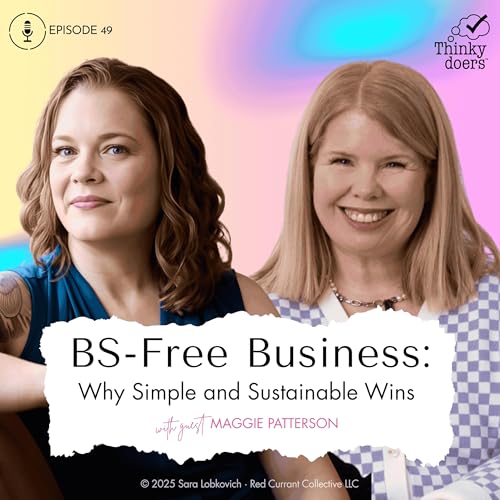
Ep 49 - BS-Free Business: Why Simple and Sustainable Wins
No se pudo agregar al carrito
Add to Cart failed.
Error al Agregar a Lista de Deseos.
Error al eliminar de la lista de deseos.
Error al añadir a tu biblioteca
Error al seguir el podcast
Error al dejar de seguir el podcast
-
Narrado por:
-
De:
You're not alone. Many of us leave corporate environments that don't fit our neurodivergent, introverted, or strategically-wired brains, only to recreate the same extractive patterns in our own businesses. But what if there was another way?
In this episode, I sit down with Maggie Patterson, creator of BS-Free Business and author of "Staying Solo," to explore why so much business advice isn't designed for businesses like yours. We dive into Maggie's "real-life rule" — if it doesn't work for your real life (with all your caregiving responsibilities, mental health considerations, and actual capacity constraints), it doesn't work in your business.
Discover why being strategically wired can be a detriment as an employee but an asset as a solo business owner, learn how to build around your actual capacity instead of your maximum capacity, and find out why the best work you'll do might just be the work that feels easy.
Episode Highlights:
- Why so much small business advice recreates the same toxic patterns we tried to leave behind in corporate life
- How manipulative marketing tactics—like income claims and pain-point selling—harm solo business owners
- Why neurodivergent and introverted people often thrive as entrepreneurs after struggling in traditional workplaces
- The “real-life rule”: building your business around actual capacity, not fantasy capacity
- How being strategically wired can feel like a liability in corporate life but becomes a superpower in solo business
- Why the most sustainable businesses are often the simplest—lean, drama-free, and built to last
Key Concepts Explored:
- The "real-life rule": building business around actual capacity and constraints rather than fantasy versions of ourselves
- The neurodivergent advantage in solo business: creating accommodations for yourself that corporate environments can't provide
- Strategic brain blindness: how strategically-wired people undervalue their most marketable assets
- The employee detriment of strategic thinking: why strategic minds struggle in corporate but thrive as entrepreneurs
- The paradox of easy work: why the highest-value, most enjoyable work should feel effortless when you're truly skilled
- Income claim marketing and pain point manipulation vs. empathetic connection in business communication
- Lesser of evils decision-making: sustainable business choices for people with anxiety, ADHD, and mental health challenges
- Simplicity as competitive advantage: lean operations, minimal services, and building incrementally rather than perfectly
- Right-sizing dreams and expectations to prevent business-induced breakdown during caregiving and life challenges
- Neurodivergent entrepreneurship as affirmation: self-employment as refuge for those who don't fit traditional work culture
Common Questions Answered:
- How can I build a business that works with my ADHD/anxiety/neurodivergence?
- Why do I struggle with traditional business advice?
- Is self-employment viable for introverts and strategic thinkers?
- How do I build for my real capacity instead of my maximum capacity?
- Why does my strategic thinking feel undervalued in corporate environments?
Notable Quotes:
"So much of online business is built on this fantasy version of yourself—someone with endless time, endless energy, endless capacity. And it just doesn’t exist." – Maggie Patterson [00:05:00]
"We left corporate because it didn’t fit—but then we build businesses that are just as extractive, just as harmful, just as unsustainable." – Maggie Patterson [00:07:00]
"If it doesn’t work in your real life—with your caregiving, your...


